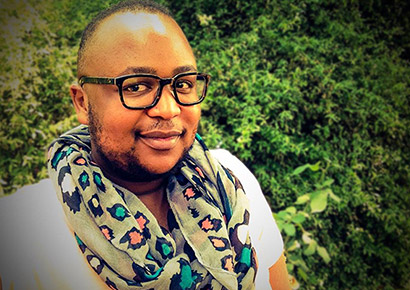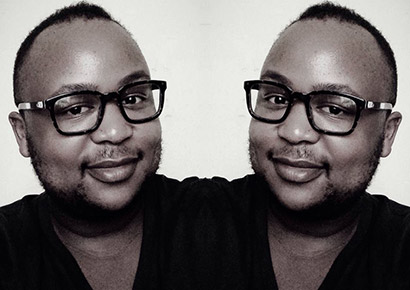Kopano, a member of that rare species; the black bear
 The bear community has blossomed in South Africa in recent years, but it’s been a predominantly white phenomenon. So, when we heard that Johannesburg’s Kopano Motsoeneng identifies as a black bear, we wanted to find out more.
The bear community has blossomed in South Africa in recent years, but it’s been a predominantly white phenomenon. So, when we heard that Johannesburg’s Kopano Motsoeneng identifies as a black bear, we wanted to find out more.
For those who don’t know, bears are gay men who form a community that celebrates all body types, including various weight ranges and facial and body hair, often (but not always) embracing a more masculine sensibility.
Kopano first came out as a bear to the public in a recent interview with WeTheBrave (watch it below). This 31-year-old fashionista was born in Soweto and went to a KZN high school, where he says he experienced a lot of bullying.
Kopano believes, however, that those experiences gave him “a very strong backbone and thick skin” which, along with supportive and trustworthy friends, helped him get through difficult times.
Going to his first bear gathering was, Kopano admits, a “daunting experience” and stepping out of his comport zone, but, he says, he was generally welcomed. We got in touch with this 30-year-old groundbreaker in China, where he’s now working and studying international relations, to chat about being a proudly black bear.
Kopano, when did you start identifying with the bear culture?
It was in 2013, when I was out with friends. A mate of mine had a mate from the UK and he asked me if I was a cub or a bear. I didn’t know what he was asking as I didn’t know about the bear culture. So I did some research and I found comfort with what I read.
What was it about being a bear that appealed to you?
It was about being a chubby guy and being accepted and adored for being nothing but myself.
How would you define a bear, and what does it mean to you?
Well, a bear to me is all about being comfortable in your own skin without trying too hard to look like a GQ cover. It’s also about being a humble man, not like those who think of themselves as God’s gift to mankind.
What kind of bear do you see yourself as?
I’m a cub. Maybe even a stylish cub. I’ve given myself a nickname amongst our group. I call myself Bearsace!
 Do you think that as gay men we often segment ourselves into various identities or subcultures?
Do you think that as gay men we often segment ourselves into various identities or subcultures?
We do. We find a common feeling or lifestyle that suits us and we stick to it. The only thing is that one could easily be lost in it and only open our eyes when it’s too late.
Has the reality of being a bear been what you hoped it would be?
Yes and no. The reason I say that is that it’s come with its challenges. I entered a community of mostly older generation white Afrikaans men. I had my own insecurities and they also (not all) had questions; trying to find out who I was and what I was doing in their company. I also asked real questions that affect our everyday living, so I know I’ve pushed a few buttons. So some just tolerate me but others do celebrate me.
We’ve struggled to find black bears in South Africa. Why do you think it’s such a predominantly white space?
In all honesty, the events and gatherings are only posted on social media pages. On most of those pages the main interaction is in Afrikaans and every now and then English. The black bears who do go and know about these events often go knowing that they have friends. Also, the venues really do cater for white people more than black people. Like, it would be awesome to have bear gatherings like a shisa nyama, or a car wash vibe.
Would you urge any other black bears to come out to the forest?
Yes I would! I get inbox messages from time to time, saying that they appreciate me for being a voice for the black race. I just keep asking them to come to gatherings and meetings. If you are confident in yourself, know your worth and believe in yourself, you will be accepted.
How do your friends and family feel about you being a bear? Was it a kind of second coming out?
Yes. It was big shock to them as they thought of me as the metrosexual guy. They’re happy as long as I’m happy and true to myself.
Why did you decide to do the interview with WeTheBrave?
For me it was an attempt to encourage and comfort fellow brothers. Quite a few friends shared the post and it even made it to an international blog site.
Do you hope to make an impact on opening up bear culture in South Africa and making it more diverse?
I do. I hope that one day all bears – black, white, Indian and coloured – could be sitting under one roof and not in their race groups. I’m all about a Rainbow Nation!
Do you believe that with the bears, you’ve found a community?
Yes I have. I’m blessed to be a bear with the fellow bears that I’ve made real friendships with. It’s a brotherhood that I had been searching for, for so long.
Leave a Reply